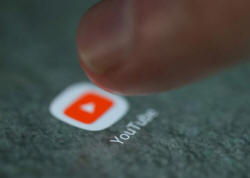|
 YouTube
debuts comedy video series in virtual reality push YouTube
debuts comedy video series in virtual reality push
 Send a link to a friend
Send a link to a friend
[October 18, 2017]
By Paresh Dave
(Reuters) - YouTube virtual
reality video series "The Confessional" debuted on
Tuesday, featuring comedians Trevor Noah, Judd Apatow
and Howie Mandel, as parent company Google races
Facebook Inc to attract viewers to the new medium.
|
|
 Google, a unit of Alphabet Inc , has boosted
funding for virtual reality video producers since it unveiled in
October the $79 Daydream View headset, which straps a smartphone
display close to a user's eyes for stereoscopic video. Google, a unit of Alphabet Inc , has boosted
funding for virtual reality video producers since it unveiled in
October the $79 Daydream View headset, which straps a smartphone
display close to a user's eyes for stereoscopic video.
About 500,000 immersive videos are available on YouTube, and the
streaming service plans to increase the titles and genres.
"Nearly half the time in VR headsets is spent in video," Julia
Hamilton Trost, partner development manager at Google VR, said
in an interview. "We need to give creators tools to make VR
content more easily, then also partner with people to push
content to the platform as well."

An undisclosed Google grant to production company Felix & Paul
Studios in Montreal funded the creation of "The Confessional."
In seven, minutes-long episodes over the next few weeks,
comedians and YouTube stars including Lilly Singh and Grace
Helbig will confess about embarrassing and awkward moments in
their lives such as first dates gone wrong.
Felix & Paul Studios proposed the idea to Google a few months
ago and filmed at Montreal's Just for Laughs comedy festival in
July.
Underscoring the infancy of the medium, Felix & Paul co-founder
Paul Raphael said "The Confessional" marked the first time in
four years that the studio felt comfortable cutting between
shots in a video without disturbing the immersive experience.
Jumps can be jarring to viewers, especially when wearing a
virtual reality headset, he said.
[to top of second column] |

Felix & Paul benefits from government tax credits and venture
capital, but most of its work is funded by Facebook or Google.
Facebook announced in May plans to spend $50 million on virtual
reality content, excluding video games, over an undisclosed period.
Google has not specified overall spending for virtual reality. This
year, YouTube launched a training program for videomakers with at
least 10,000 followers that comes with a project grant of about
$30,000. The streaming service also introduced a new video format
for semi-immersive videos, which cost less to create.
Other Google VR partners have included fashion magazine Vogue and
the National Football League.
As with other YouTube uploads, virtual reality clips are supported
by ads, with revenue split between the company and the uploader.
(Reporting by Paresh Dave; Editing by Richard Chang)
[© 2017 Thomson Reuters. All rights
reserved.] Copyright 2017 Reuters. All rights reserved. This material may not be published,
broadcast, rewritten or redistributed.
 |